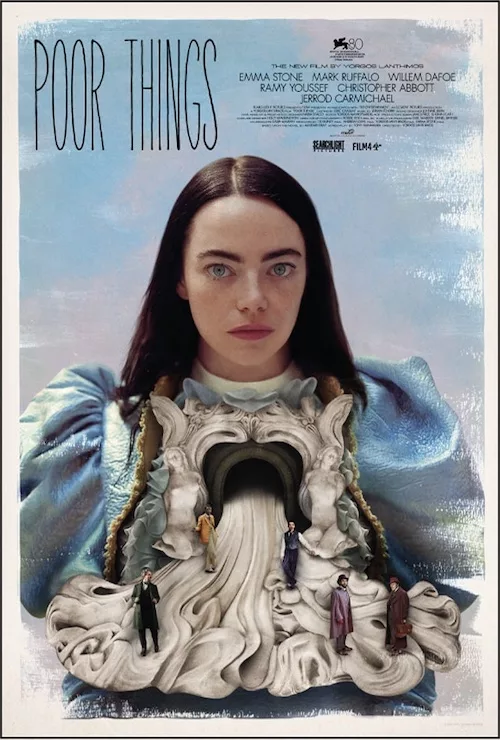Includes some spoilers
Poor Things takes place in a world only Yorgos Lanthimos could create. Like the rest of his oeuvre, the film is full of whimsy, wonder and taboo. It is fundamentally a world that you know, with cities you recognise by name, yet it is also distinctly unfamiliar. Free from time; Victorian yet alien in its technology and science, the London Bella Baxter (Emma Stone) inhabits is not the London you know all too well. Neither is Paris, Lisbon or Alexandria, where the rich live atop the hill and the city is stained a dusty orange. But these labyrinthine streets are not supposed to evoke realism; nothing about the story Lanthimos presents to his audience is real, at least visually.
Poor Things charts the course of the second life of Bella Baxter. We watch her first life come to an end abruptly as the film begins. Slowly we are introduced to our curious cast of characters: Godwin Baxter (Willem Dafoe) a Dr Frankenstein character who looks more like the Monster; Max McCandles (Ramy Youssef) Godwin’s meek and mild protégé and Ducan Wedderburn (Mark Ruffalo) the slimy lawyer come Casanova whom both cast and audience come to pity by the story’s end. Alongside this rag-tag bunch of characters, Bella navigates the world, both literally as she travels alongside an array of companions, and in the sense that she comes to understand the good and the bad, the beautiful and the ugly and her position within all of this mess.
Through the fisheye lens of cinematographer Robbie Ryan we watch as the world expands for Bella, observing something that feels as though it is not to be observed. We peek into Bella’s life as she learns rapidly and matures over the course of the story. Yet other than ‘God’ nobody truly understands the extent of her naivety. Her body is an illusion; to those around her she is a grown women, yet in actuality she is a baby, then a toddler, a teenager and so on. Literally the mind of a baby is transplanted into her head, by her father figure Godwin. In restoring her to life, Godwin must fend off those who are unaware of Bella’s true nature. As Bella navigates her physical form she finds pleasure, yet those around her find taboo. Her scandalous naivety does not protect her from the outsider world which expects her to be prim and proper. But as Bella seeks etiquette and education, she loses the childish personality which made her so alluring to the men around her. Lanthimos has the ability to make all his characters, no matter how heinous they are, somewhat likeable, often by making them so quirky you cannot help but feel warmth towards them. Take Godwin: his surgeries would not be out of place in a horror film, yet the relationship he fosters with Bella is so nurturing and eventually free that you forget what he did to create such a life to begin with.
There are endless examples of craftsmanship throughout the film, Lanthimos’ films never fail to stun visually both when it comes to set and costume. If you thought the costumes in The Favourite were pompous, you aren’t ready for the frill and frocks in Poor Things. From sick-green nightgowns to collars fit for royalty, every character, every extra is decked out in the finest of fine threads no matter the occasion adding to the whimsy.
With awards seasons around the corner, Poor Things stands out as a bolshy frontrunner in nearly all the categories. From Sound to Cinematography, Lanthimos and his crew stand a great chance at ending the season on a high, and for good reason. By pushing the boat out and leaning into the chaos, Yorgos Lanthimos has managed to craft a story unlike anything else you will see this year. Each element adds to the eerie realism despite each component being fundamentally cooky. All in all a marvel, and Lanthimos’ most original work to date.



